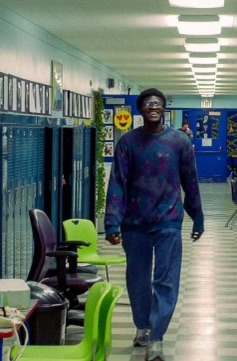David Diouf is a rising third-year majoring in Radio, Television and Film. Along with fellow SURG recipient Jackson Heller, he plans to produce their short films. His is titled Holy Mother and explores themes of Black grief.
Tell me about your SURG topic.
Diouf: It takes a look at what Black grief looks like when it’s not contingent on violence, meaning nobody gets shot and killed and nobody’s selling drugs. Not contingent on all these stereotypes. If you think about it, in 2013, Fruitvale Station came out and became a big hit and Ryan Coogler changed the game on what Black cinema looks like. You could even argue that Moonlight does that a little bit, but it’s still contingent on some stereotypes in that way. But [my film] follows the story of Sylvia, a 64-year-old Black woman, as she learns to navigate her grief and the loss of her daughter, and her grandson and how he’s dealing with those things, too. We are working with Doctor Atkinson of the Family Institute. She’s a specialist in grief. We’re working with two grief counselors to create a truthful and grounded description of what grief looks like. I could just write it, but then I’m just talking out of my ass. Overall, the goal is to create a touching, compelling narrative that takes a look at what Black grief specifically looks like when it’s removed from the circumstances that often define it.
Tell me about the decision to act in the short film.
Diouf: I wrote it for me the whole time. But I was like, ‘I’m not going to write it from my perspective.’ Not that it’s boring, but it’s very easy for me to write a story with a character that’s weirdly adjacent to me. But from the perspective of someone who is not me, I think that’s a good exercise in getting better at writing. I’m a big proponent of creating my own opportunities whenever I can. Obviously, I have an immense support system that I’m awfully thankful for. Within that, I think there also needs to be agency on my part to create these things. At the end of the day, I’m a Radio, Television and Film major. I don’t come from a lot of money. I’m first generation, low income. If I’m going to pursue what I love, I don’t want to pursue it without the care and time that it deserves.
What do you want people to get out of this film?
Diouf: Thematically, I’ve been wanting to tell a story about grief and what grief looks like for a really long time. I always struggled with how I wanted to tell it. I’ve tried a lot, don’t get me wrong. Holy Mother is maybe the fifth one. I always struggled with executing it because I was attaching it to my own experience with grief a little too much. As a result of it, the message gets muddled and it gets autobiographical. There are moments for that, but I don’t think the stories I want to tell fit into that specific aisle. Telling it from a different person’s perspective has helped me take a step back. I’m still working on the ending. I have two options in mind. One of them would support the thematic anchor of grief is nasty and complicated and horrible, but it’s a lot easier with other people. The other option would support the thematic anchor of grief is nasty, disgusting and horrible, until you allow yourself to grieve. Maybe there’s a combination there, but then am I saying too much? Am I preaching to the choir then? I don’t know. And not only is it nasty and horrible – I’m being hyperbolic here – but there are moments of joy within it. Basically just telling a universal story of what grief may look like through a very specific lens. I hope through that specificity, it’ll be universal.
Meet the other SURG Recipients!
